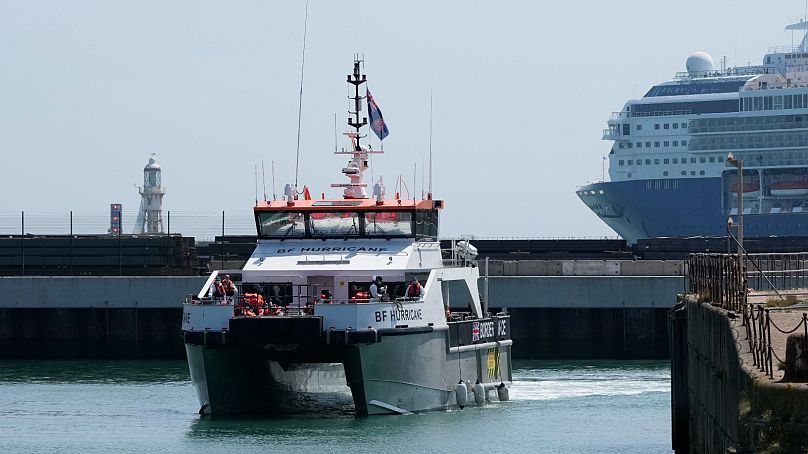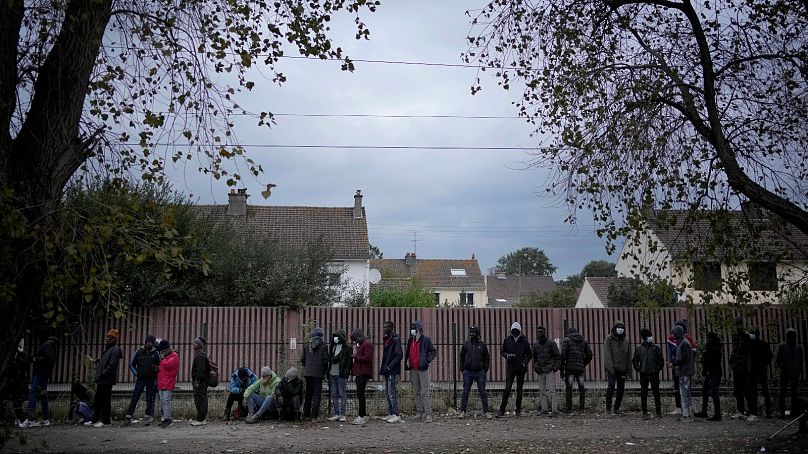It's believed more than 20,000 migrants have attempted the crossing this year, up from 8,500 in 2020.
The number of migrants trying to reach England on boats from France has more than doubled in a year.
About 15,500 migrants had either attempted or successfully crossed by August 31, according to the French Maritime Prefecture.
Since then the number has continued to grow at a rapid pace with French authorities successfully preventing four times more small boat crossings in September than in the same month last year and rescuing more than 1,470 people in the English Channel within the first four days of November alone.
Britain's Home Office no longer provides a tally but it is believed the number now exceeds 20,000 — that's a 235% increase on 2020 when 8,500 people braved the crossing.
On November 24, dozens of migrants died after their boat sank near Calais. The accident marks the biggest ever loss of life during attempted illegal crossings of the English Channel, according to the International Organization for Migration.
So what explains this increase?
Too few safe and legal pathways to the UK
"Limited access to, or inadequate safe and legal avenues, are contributing to more people taking alternative means, including crossing the Channel in small boats," a spokesperson for the United Nations' International Organisation for Migration (IOM) told Euronews.
Several other experts from the Migration Policy Group and the University of Oxford's Migration Observatory concurred.
Clare Mosely, founder of the Care4Calais NGO explained to Euronews that "boat crossings are one of the very few ways that people can get to the UK to claim asylum.
"For all practical purposes there is no legal way to travel, so the only choice is whether you risk your life in a small boat or hidden in a lorry," she said.
Lorries, however, have waned in popularity as the length of time needed for a successful crossing has lengthened due to technological advances.
Claire Millot, from the Salam migrant welfare NGO, told Euronews that a decade ago, it would usually take three weeks for a migrant to successfully cross the English Channel stashed away on a lorry.
To curb such crossings, dogs were deployed, followed by carbon dioxide detectors which flag whether someone is breathing even if they are well hidden. Now, lorries are randomly put through scanners and the average crossing time is counted in terms of months instead of weeks.
The sea is much quicker and "something that worked very well this year," she went on. "The crossings were very successful overall and so inevitably people afterwards call each other to say 'I crossed on an inflatable boat' and so it encourages others to do it."
Additionally, Dr Peter William Walsh, a researcher at the University of Oxford's Migration Observatory, explained, "the route has become more established, probably with better-organised trafficking networks, in part likely due to increased policing on other routes".
What makes the UK so attractive?
There is no study definitely stating what drives people to go to the UK illegally but it is believed to be a combination of factors including the presence of family members or acquaintances, their belief that the country is open, safe and tolerant and their ability to get by with a few words of English.
"They also know that there are no identity papers in England and that they can easily find undeclared work, more so than here (in France)," Salam's Millot said.
"The legislation is not the same, the controls are not the same, it's much easier in England to work illegally in the long term," she added.
It may also be that they have been refused asylum in EU member states and ordered to leave and see the UK as their last chance.
Still, Britain is far from seeing the number of asylum seekers continental countries are dealing with. Some 29,450 applications for asylum were lodged in the UK in 2020, according to government figures. That's down from a 2002 peak of 84,132.
More than 416,600 new asylum claims were lodged in European Union member states last year, including 102,500 in Germany, 81,800 in France, 37,900 in Greece and 21,200 in Italy, according to Eurostat.
Dr Walsh also pointed out that the UK is also not, comparatively speaking, "an especially popular destination for unauthorised boat arrivals".
"In 2020, Italy received 34,000 people who arrived without authorisation by boat, while Spain received over 40,000," he said.
'Unspeakable' conditions
Yet, the increase in Channel crossings has seen Britain's Conservative government adopt a much tougher line on illegal immigration and present a draft bill aiming to drastically curb the phenomenon.
The new rules, if approved, would see asylum claims automatically rejected if the claimant has travelled through a "safe country" such as France. Those found to have entered the UK illegally would face up to four years behind bars while people smugglers would face life sentences while family reunifications will also be made much harder.
The UN's Refugee Agency (UNHRC) has warned that the plans risk creating a "two-tier asylum system" that "delivers unjust penalties to refugees in need of protection".
The UK has also struck another contract with France, worth €63 million, to equip and increase French patrols at the border.
Britain's Home Office has touted the cooperation, saying that thanks to its work with police and international partners, 300 arrests and 65 convictions related to "small boat criminality" had been secured by October.
The number of migrants living in a precarious situation in Calais or near Dunkirk is not precisely known. Authorities estimate that about 800-900 are in Calais, NGOs say the number has increased over the past few months to reach 1,500.
These are primarily people from countries including Syria, Libya, Afghanistan or sub-Sahara Africa who flee conflict or violence.
That remains far below the peak of 2016 when the so-called Calais Jungle housed nearly 10,000 people but conditions remain similarly deplorable.
"The situation in Calais is unspeakable," Care4Calais's Moseley told Euronews. "There continues to be a ban on distribution of food in some parts of Calais, and actions by the police against migrants are unrelenting. In many parts of Calais areas of wasteland have been stripped bare of trees and scrubs so that people cannot erect tents to sleep in."
"We are seeing people sleeping outside on bare tarmac, in disused petrol stations and behind derelict shops. They are ceaselessly moved often and often violently woken up in the early hours of the morning so that sleep is disrupted and exhaustion is common. It is entirely understandable that they would take great risks to escape," she said.
'Deeply unfair'
The UK's planned immigration and asylum overhaul, currently making its way through parliament, is unlikely to have much effect in curbing the numbers, at least in the short term.
Research shows little evidence that those hoping to get into the UK have any detailed knowledge of the country's asylum procedures, benefit entitlements or availability for work, Dr Walsh stressed.
"There was even less evidence that the respondents had a comparative knowledge of how these conditions varied between different European countries. If asylum-seekers are not aware of asylum policy, this suggests their decisions are unlikely to be much influenced by it," he added.
Millot of Salam said that there has been no chilling effect so far from the draft bill or the UK-France border deal.
"We know that some of them, when they arrive, are not put in a hotel but in closed centres. We hear about it but they (other migrants hoping to cross) don't know. Others tell them, the smuggler for example, that it's not true. And because they know someone who crossed and didn't have this fate, because some of them finish the crossing by swimming to avoid being picked up by the Home Office, they hope to avoid controls," she said.
The UK has defended its bill by arguing there are "other safer and legal routes" such as humanitarian refugee resettlement with UNHCR and the Afghan Citizens’ Resettlement Scheme, which was launched following the country's takeover by the Taliban insurgent group in August.
Its bill states that "since 2015, we have resettled almost 25,000 men, women and children seeking refuge from cruel circumstances across the world — more than any other European country".
It says illegal routes into the country, such as by boats or lorries, are "deeply unfair" because "the presence of economic migrants — which these illegal routes introduce into the asylum system inhibits our ability to properly support others in genuine need of protection."
Every weekday, Uncovering Europe brings you a European story that goes beyond the headlines. Download the Euronews app to get a daily alert for this and other breaking news notifications. It's available on Apple and Android devices.













